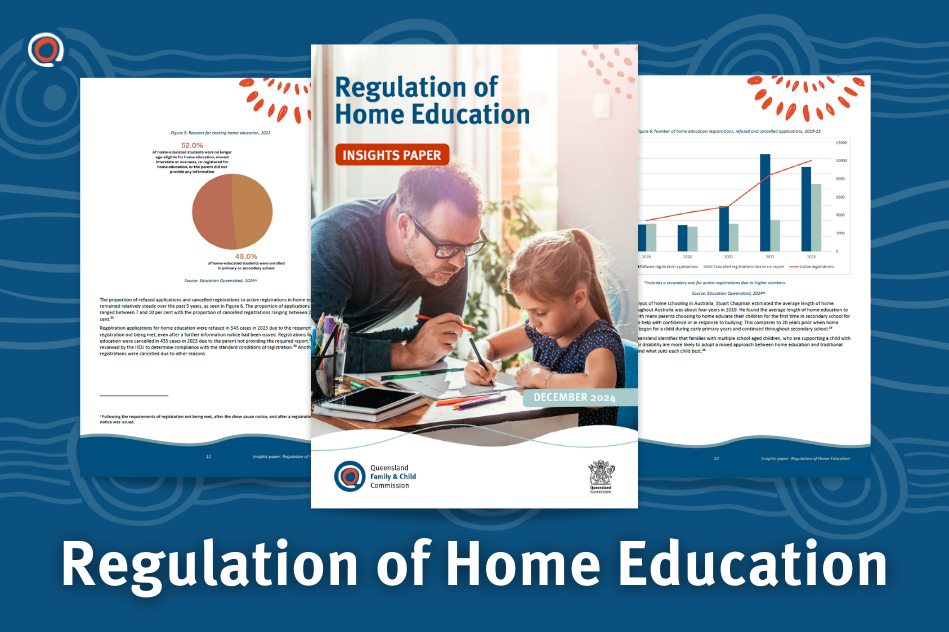Home education data shows room for improvement in child safety
10 December 2024-The Queensland Family and Child Commission (QFCC) has identified improvements needed to better assess the safety of children who are registered for home education.
-The review sampled 500 children registered for home education, finding 35 were identified as living in environments that had experienced domestic and family violence or where there was suspected or substantiated harm.
-The review findings do not imply that home schooling presents a greater risk to children, but it does confirm that negative safety events are occurring in some households registered for home education and makes recommendations to government to strengthen oversight of the home-schooling system.
Around 10,000 children are registered for home education in Queensland, an increase of almost 200 per cent since 2019. Queensland has no legislative requirement to conduct regular home visits for children enrolled in home schooling, meaning we have limited or no visibility of these children and their wellbeing and limited opportunities to see and address concerns before they reach crisis point.
Queensland’s Child Death Review Board 2022–23 Annual Report recommended legislative change to strengthen oversight of our home-schooling system, which was informed by risks identified in home-schooling data and by findings of the board’s child death reviews. The QFCC was asked to consider the prevalence of child safety concerns in home education households.
The QFCC worked with the Department of Education, the Queensland Police Service, and the Department of Child Safety to match data for home education households to identify those with occurrences of domestic and family violence or suspected or substantiated child harm. The random sample of 500 children found matches for 35, or seven per cent.
The outcomes of this data matching exercise demonstrate the ease of data linkage to identify safety concerns. This data does not indicate children who are home schooled are at a greater risk of harm than those who attend school, but it does confirm that safety risks were present in some of these homes.
The review also found there is a lack of systems to support information sharing between agencies and families about children’s needs and wellbeing when educated at home, which further limits oversight of a child’s safety and wellbeing.
The review made two recommendations focused on regular data sharing between agencies to better support children who are home schooled, strengthening oversight of children registered for home education, and exploring ways to increase children’s participation in decisions about their learning needs.
The review will be available on the QFCC website at www.qfcc.qld.gov.au/sector/insights-papers
Quotes attributed to QFCC Principal Commissioner Luke Twyford
“Parents have a right to choose the most suitable learning environment for their child.
“Many children in Queensland have a positive experience of education and receive all the experiences that
children who attend school do—excursions, a quality education, and connections to extra-curricular activities and
social activities.
“The Child Death Review Board and the QFCC were not concerned with the parents and carers who provide their
children with an excellent education at home, but we were interested in those who choose home schooling
where harm may be occurring to their child in the absence of any formal oversight.
“The data matching exercise in this review demonstrated the ease of data sharing between agencies that can
increase visibility of children living and learning in potentially unsafe environments, with no impact on the
households who do the right thing by their child.
“We know that school-based learning environments afford children a level of informal monitoring, social
connection and access to wellbeing support, and we need to make sure all children in Queensland have this same
experience.
“Any child harmed is one too many, and an improved legislative framework would provide better safeguards to
identify and respond to children at risk of harm.
“I encourage government to implement our recommendations and take active steps to better protect Queensland
children.”
ENDS
For media information contact:
Kirstine O’Donnell | Queensland Family and Child Commission
Phone: 0404 971 164
Email: media@qfcc.qld.gov.au

